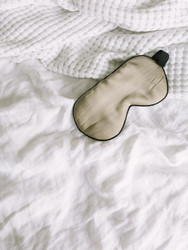The Importance of Sleep for Student-Athletes: How to Get Enough Rest
Posted by Kayla Murphy on 18th Sep 2024
As a student-athlete, you're constantly balancing school, sports, social life, and extracurriculars, which can make sleep feel like a luxury rather than a necessity. But getting enough quality rest is just as crucial to athletic performance as practicing drills or lifting weights. In fact, sleep is one of the most powerful tools to help you stay sharp, improve recovery, and excel in both academics and sports.
Why Sleep Matters for Student-Athletes
1. Enhanced Athletic Performance
Sleep is when your body recovers and repairs itself, especially after a tough practice or game. During deep sleep, your muscles rebuild and grow, which is crucial for endurance, speed, and strength. Moreover, studies have shown that athletes who get adequate sleep perform better physically and mentally. For example, a Stanford study found that basketball players who increased their sleep to 10 hours a night improved their free-throw and three-point shooting accuracy by over 9%. Whether you're playing football, soccer, or volleyball, sleep helps you perform at your best on game day.
2. Faster Recovery from Injury
Injuries are an unfortunate part of sports, but getting enough sleep can help you bounce back quicker. Sleep helps reduce inflammation in the body, which can speed up recovery from injuries like sprains, strains, and sore muscles. It also boosts your immune system, which is essential for preventing illness and keeping you in the game. For athletes facing recovery periods, prioritizing rest is just as important as following a rehab plan.
3. Mental Focus and Academic Success
It’s not just about physical performance; sleep is also key for mental sharpness. Student-athletes have to juggle demanding schedules, which means staying focused in class and during study sessions. Sleep strengthens cognitive functions such as memory retention, focus, and decision-making. It’s easier to absorb new information, solve problems, and make quick decisions both in the classroom and on the field when you’re well-rested.
4. Improved Reaction Time and Reduced Risk of Injury
Whether you're chasing down an opponent or making a split-second decision on the court, fast reflexes are essential in sports. A well-rested brain responds more quickly to stimuli, making you more agile and aware of your surroundings. On the flip side, sleep deprivation can lead to slower reaction times and poor judgment, which increases your risk of injury.
How Much Sleep Do Student-Athletes Need?
While the standard recommendation for teenagers is 8-10 hours of sleep per night, student-athletes often need more due to the physical and mental demands placed on their bodies. Many experts recommend aiming for 9-10 hours of sleep per night during training and competition seasons. Knowing you need more sleep and actually getting it are two different things. Here are some practical tips to ensure you're resting well:
1. Set a Consistent Sleep Schedule
Go to bed and wake up at the same time every day, even on weekends. This helps regulate your body’s internal clock and ensures you get consistent rest. Over time, your body will naturally begin to feel tired and wake up at the right times.
2. Create a Relaxing Bedtime Routine
Help your body unwind by establishing a pre-sleep routine that calms your mind. This could include reading a book, doing some light stretching, or meditating. Avoid screens (phones, computers, and TVs) at least 30 minutes before bed, as blue light can interfere with melatonin production, the hormone responsible for regulating sleep.
3. Limit Caffeine and Sugary Snacks Before Bed
What you consume can affect your sleep quality. Avoid caffeinated beverages like soda, energy drinks, and coffee later in the day. Similarly, large, heavy meals or sugary snacks close to bedtime can interfere with sleep, so try to stick to lighter snacks if you're hungry before bed.
4. Optimize Your Sleep Environment
Make sure your bedroom is set up for rest. Keep it cool, dark, and quiet, with comfortable bedding. Blackout curtains, white noise machines, and cozy blankets can help create a peaceful environment conducive to restful sleep.
5. Power Naps
If your schedule is too packed to get 9-10 hours of sleep at night, consider taking short naps during the day. A 20-30 minute nap can give you a quick energy boost without making you groggy or affecting your nighttime sleep.
Balancing Sleep with a Busy Schedule
As a student-athlete, you’re constantly on the go, making it difficult to fit in 9+ hours of sleep. Here’s how you can adjust your schedule to make rest a priority:
- Time Management: Plan your day to ensure you're not staying up too late. Use free periods or breaks in the day to get ahead on homework or study, so you're not cramming late at night.
- Limit Screen Time: Social media and Netflix can be tempting distractions, but they can also eat into your sleep time. Try setting limits on screen time to keep your sleep schedule on track.
- Communicate with Coaches and Teachers: If you're struggling to balance sports and school, talk to your coaches and teachers. They can help you prioritize tasks and may allow for some flexibility if you're feeling overwhelmed.
Why Lifestyles Sports Supports Student-Athletes' Wellbeing
We are committed to supporting student-athletes not just with the gear they need, but also with valuable advice for staying healthy and performing their best. From helping you find the right sports gear, like Nfinity cheer shoes or football helmets, to offering tips on nutrition and sleep, we’re here to ensure you’re set up for success in every aspect of your athletic journey.
Sleep isn't just a luxury for student-athletes—it's a necessity for staying competitive, avoiding injury, and achieving both academic and athletic goals. By prioritizing sleep and developing healthy sleep habits, you’ll be setting yourself up for success on the field and in the classroom. And when you're ready to fuel your athletic journey with the best gear, be sure to visit us at Lifestyles Sports for all your sports equipment needs.
Your body and mind will thank you, and so will your performance! So rest up, gear up, and get ready to take on the competition.





